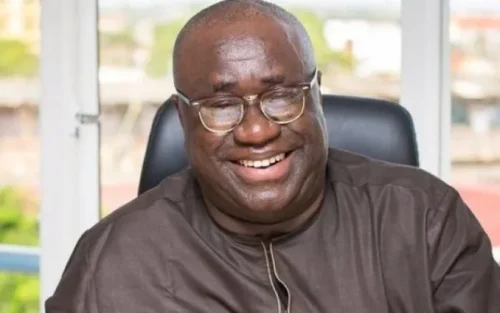Security analyst Prof. Kwesi Aning has delivered a scathing assessment of Ghana’s fight against illegal mining, arguing that authorities continue targeting low-level operators while the powerful financiers orchestrating galamsey operations remain completely untouched.
Speaking on JoyNews today, Prof. Aning questioned why the country’s response focuses on superficial wins rather than dismantling the financial networks that truly sustain the destructive industry. His comments come as the National Anti-Illegal Mining Operations Secretariat (NAIMOS) intensifies crackdowns across mining communities, seizing equipment and destroying makeshift camps along polluted rivers.
But Prof. Aning isn’t buying the narrative of success. According to him, Ghana needs far better intelligence on who actually controls the money flowing through galamsey networks. Without mapping these financial kingpins, he said, the country will continue arresting “small boys and small girls” while the real power brokers watch from a safe distance.
The security expert’s frustration centers on what he sees as deliberate avoidance of the difficult questions. Where does the money go? How does it enter the system? Who purchases the equipment? These aren’t mysteries that require magic to solve, yet they remain conveniently unanswered.
Ghana’s anti-galamsey laws provide robust frameworks for action. Act 1030 of 2020 and the Signals Act 1040 of 2020 give statutory security agencies considerable powers, while the National Security Strategy document explicitly classifies illegal mining as one of four key national threats. So why can’t these institutions deliver results that NAIMOS apparently can?
Prof. Aning suggested the answer lies in political commitment, or rather, the lack of it. Institutions need more than legal authority; they require leadership willing to back them with resources, protection from interference, and genuine determination to follow the money wherever it leads. Short-term thinking dominates current strategies, he argued, with authorities celebrating equipment seizures while ignoring the systemic corruption that allows galamsey to flourish.
The timing of his critique is notable. Recent NAIMOS operations between October 5 and 9 targeted foreign financiers and destroyed illegal mining sites, representing what officials describe as comprehensive action. Yet Prof. Aning’s point stands: arresting Chinese nationals operating excavators or burning wooden structures along riverbanks doesn’t touch the Ghanaian politicians, traditional leaders, or business elites who reportedly facilitate and profit from the trade.
This isn’t about questioning whether front-line enforcers work hard. It’s about whether Ghana possesses the political courage to investigate who signs off on mining permits in protected areas, which banks process suspicious transactions, or how foreign nationals acquire heavy machinery that enters the country without proper documentation.
Prof. Aning’s assessment suggests Ghana remains stuck in a cycle where visible action substitutes for meaningful reform. The country gets periodic waves of enforcement that generate headlines and photo opportunities, but the underlying system that enables galamsey continues operating smoothly. Water bodies keep getting destroyed. Forest reserves keep disappearing. And somewhere, people who’ll never see a courtroom keep getting richer.
The question isn’t whether Ghana can fight galamsey. The question is whether Ghana’s leadership genuinely wants to fight the people who matter most in the galamsey economy. Until that changes, Prof. Aning implied, expect more of the same: dramatic raids, impressive equipment totals, and absolutely no dent in the networks that truly count.
Source: newsghana.com.gh










